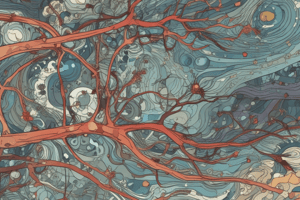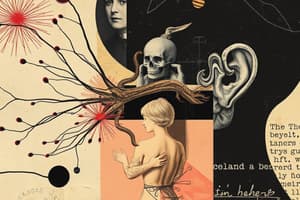Podcast
Questions and Answers
What is the key difference between tonic and phasic receptors?
What is the key difference between tonic and phasic receptors?
Phasic receptors adapt, whereas tonic receptors exhibit little or no adaptation.
How does the cortex tell the difference between hot and cold?
How does the cortex tell the difference between hot and cold?
Hot and cold are conveyed by different sensory receptors that are parts of separate 'labeled lines.'
Which cells were important in Will's recovery after his femoral nerve was crushed?
Which cells were important in Will's recovery after his femoral nerve was crushed?
Schwann cells, macrophages, and the neurons themselves.
How are dorsal roots and dorsal rami different?
How are dorsal roots and dorsal rami different?
What is the response called when Juan's big toe pointed up and his other toes fanned out?
What is the response called when Juan's big toe pointed up and his other toes fanned out?
Dorsal root ganglia contain:
Dorsal root ganglia contain:
Which reflex causes reciprocal activation of the antagonist muscle?
Which reflex causes reciprocal activation of the antagonist muscle?
Why is damage to peripheral nerve fibers often reversible?
Why is damage to peripheral nerve fibers often reversible?
What clinical information can be gained by conducting somatic reflex tests?
What clinical information can be gained by conducting somatic reflex tests?
Which cranial nerve is NOT involved with the eye?
Which cranial nerve is NOT involved with the eye?
Which cranial nerve is purely sensory?
Which cranial nerve is purely sensory?
Which cranial nerve's name means 'the wanderer'?
Which cranial nerve's name means 'the wanderer'?
Which reflex tests the integrity of L4 to S2?
Which reflex tests the integrity of L4 to S2?
Collections of neuron cell bodies in the peripheral nervous system are known as?
Collections of neuron cell bodies in the peripheral nervous system are known as?
In a reflex arc, the muscle fiber or gland that responds to the efferent impulses is known as the?
In a reflex arc, the muscle fiber or gland that responds to the efferent impulses is known as the?
Which cranial nerve controls chewing food?
Which cranial nerve controls chewing food?
The two-point discrimination test assesses the patient's for?
The two-point discrimination test assesses the patient's for?
Wallerian degeneration is the?
Wallerian degeneration is the?
Hilton's law states that?
Hilton's law states that?
Which of the following structures is NOT a part of the peripheral nervous system?
Which of the following structures is NOT a part of the peripheral nervous system?
Proprioceptors advise the brain of?
Proprioceptors advise the brain of?
Fast-adapting receptors are called?
Fast-adapting receptors are called?
Most nerves are able to transmit impulses both to and from the central nervous system.
Most nerves are able to transmit impulses both to and from the central nervous system.
Most central nervous system axons are able to regenerate following injury.
Most central nervous system axons are able to regenerate following injury.
A nerve that carries autonomic signals away from the central nervous system is classified as a?
A nerve that carries autonomic signals away from the central nervous system is classified as a?
All spinal nerves are mixed nerves.
All spinal nerves are mixed nerves.
If the phrenic nerve were severed, what would be the most immediate effect?
If the phrenic nerve were severed, what would be the most immediate effect?
In a reflex arc, the __________ transmits afferent impulses to the central nervous system.
In a reflex arc, the __________ transmits afferent impulses to the central nervous system.
Does a reflex arc include five neurons?
Does a reflex arc include five neurons?
What does it mean for a reflex to be 'somatic'?
What does it mean for a reflex to be 'somatic'?
Classify each reflex studied in lab as somatic or visceral and as spinal or cranial:
Classify each reflex studied in lab as somatic or visceral and as spinal or cranial:
Which nerve plexus roughly covers the anterior thigh?
Which nerve plexus roughly covers the anterior thigh?
Explain how sensory adaptation affects sensory neurons.
Explain how sensory adaptation affects sensory neurons.
Briefly explain what referred pain is.
Briefly explain what referred pain is.
Which reflex is completed faster: patellar or salivary?
Which reflex is completed faster: patellar or salivary?
In which area can you more easily make subtle adjustments to your muscles?
In which area can you more easily make subtle adjustments to your muscles?
If given a pin prick on the sole of your foot that feels painful but does not lead to withdrawal, where might the problem be?
If given a pin prick on the sole of your foot that feels painful but does not lead to withdrawal, where might the problem be?
If given trouble moving your tongue, which cranial nerve is likely involved?
If given trouble moving your tongue, which cranial nerve is likely involved?
The sensory receptors that sense touch, pressure, or tension have ion channels that are?
The sensory receptors that sense touch, pressure, or tension have ion channels that are?
Which cells are most helpful in repairing axons of injured neurons?
Which cells are most helpful in repairing axons of injured neurons?
In general, the effector of a reflex arc could be?
In general, the effector of a reflex arc could be?
Which cranial nerves concern the tongue?
Which cranial nerves concern the tongue?
What is the 'modality' of the oculomotor cranial nerve?
What is the 'modality' of the oculomotor cranial nerve?
Flashcards are hidden until you start studying
Study Notes
Receptors and Sensory Pathways
- Tonic receptors do not adapt; they continuously send signals, reminding us of potential harm (e.g., pain).
- Phasic receptors adapt quickly to stimuli, ceasing to fire during constant stimulation.
- Different sensory receptors in labeled lines differentiate between hot and cold, with specific receptors for each temperature range.
Nerve Function and Recovery
- Schwann cells, macrophages, and neurons assist in the recovery process of damaged peripheral nerves.
- Dorsal roots (medial, sensory only) and dorsal rami (lateral, mixed motor and sensory) differ in location and fiber composition.
- The Babinski's sign indicates corticospinal tract damage when toes fan out upon foot stimulation.
Reflex Arcs and Neurological Assessments
- Reflex arcs consist of five components: receptor, sensory neuron, integration center, motor neuron, and effector; may not require five neurons.
- Different reflexes can be classified as somatic (voluntary) or visceral (involuntary) and can be either spinal or cranial.
- Testing spinal reflexes can reveal nervous system integrity, with exaggerated or absent reflexes indicating pathology.
Cranial Nerves and Peripheral Nervous System
- Trigeminal nerve controls chewing; optic nerve is purely sensory.
- Vagus nerve extends to thoracic and abdominal regions; cranial nerves IX (glossopharyngeal) and XII (hypoglossal) are involved with the tongue.
Sensory and Motor Pathways
- Congestion nerve signals can indicate the integrity of the nervous system or specific spinal cord segments.
- Reflex centers utilize mechanisms like sensory adaptation to regulate the body's response to stimuli, leading to reduced action potential firing from persistent stimuli.
Peripheral vs. Central Nervous System
- Peripheral nerves can regenerate due to the support of Schwann cells, unlike CNS fibers which are inhibited by oligodendrocytes.
- All spinal nerves are classified as mixed nerves, transmitting both afferent (to CNS) and efferent (from CNS) impulses.
Special Cases and Considerations
- The phrenic nerve is essential for breathing; its damage causes immediate respiratory failure.
- Wallerian degeneration refers to distal damage and loss of nerve components after injury due to nutrient deprivation.
- Hilton's law states that nerves serving muscles at joints also innervate the overlying skin but do not innervate the joint itself.
Additional Key Concepts
- Fast-adapting receptors are called phasic receptors; proprioceptors provide information about body movements.
- Two-point discrimination tests measure spatial discrimination abilities of sensory perception.
- Types of axons impacted by injury differ significantly between the PNS (regenerative) and CNS (typically non-regenerative).
Study of Reflexes and Symptoms
- Reflexes like the patellar tendon reflex are quicker due to fewer involved neurons, emphasizing their role in immediate responses.
- For sensory pathways, issues can arise in specific reflex arc components, indicating the likely site of dysfunction.
- Understanding which cranial nerves impact specific functions is crucial for diagnosing neurological conditions.
Studying That Suits You
Use AI to generate personalized quizzes and flashcards to suit your learning preferences.




